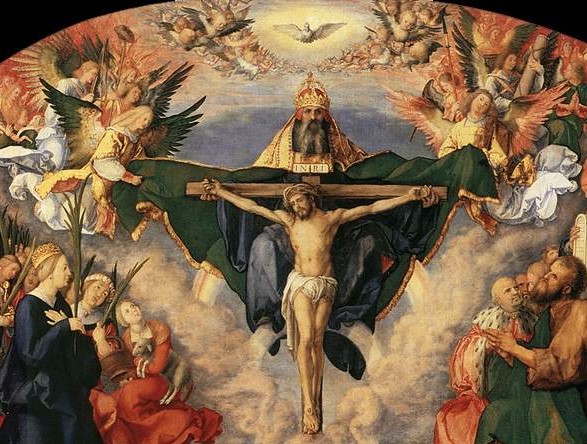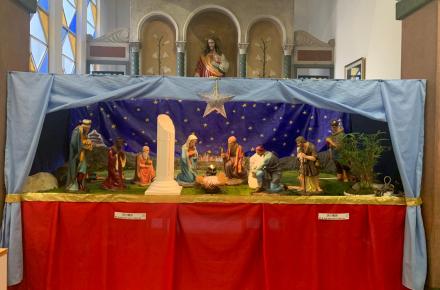On February 25th, at St Teresa's parish church in Kowloon, I lectured a Lenten retreat for the English-speaking community, with the participation of around 100-150 people. Here is the text of what I said, hoping that it can be of some help also for you.
(The numbers in brackets at the beginning of the paragraphs, or at the end of a sentence, refer to the slide numbers of a PowerPoint arranged for the occasion).
False Images of Lent
(2) Generally speaking, in Italy, the word “Lent” has a very bad fame. If you meet a person who has a sad gaze, not smiling, a person who looks like having been beaten and at the same time looks angry, we say: “You have a Lent face!”. Lent is the quintessence of a sad life, full of pain and useless suffering. And if you ask the reason behind this face, then you discover that perhaps that man was stolen of his wallet, or had a strong argument with his wife, or lost his job.
(3) In Hong Kong we have a similar experience. I asked some friends what does it mean Lent for them. One of them answered: The idea of Lent is associated with bad experiences: sacrifices, not eating, not playing, not watching tv… a period of time full of prohibitions, something which suffocates the natural expansion of life.
The favourable time
(4) For the Church, the Lenten period is defined as “the favourable time”: 40 days before Easter, catechumens and Catholics would pray intensely, make all effort to feast the victory of Life over death, with joy and fraternity.
The 40 days are “favourable time” because they have an aim, a target which will be achieved.
In fact, what makes our time a “favourable time”? It is the hope of achieving an aim, a target.
(5) Before the Chinese New Year people have bought lots of flowers to adorn their houses because they hope that the new year can be as flourishing as those flowers; they blow firecrackers and fireworks so that their life can chase away the evil spirits and colours and light can shine in the darkness of their life.
But all these ways are just fragile hopes and do not have any certainty of achievement.
Instead, the Church repeat with certainty: “This is the favourable time!”.
2 Cor 6,2 says
: “’In a favorable time I listened to you, and in a day of salvation I have helped you.’ Behold, now is the favorable time; behold, now is the day of salvation”.
Reconciliation with God
(6) St Paul affirms with certainty that this is the favourable time because God is committed to listen to us and to help us. This is a very important point:
Lent is not the time in which we do something for our faith, for being good persons, to be morally impeccable. It is the time in which God decides to work for us, to listen to us, to help us.
This “work” of God for us is “reconciliation”. Just before the versicle of the favourable time, St Paul says:
“And all this is from God, who has reconciled us to himself through Christ and given us the ministry of reconciliation,
namely, God was reconciling the world to himself in Christ, not counting their trespasses against them and entrusting to us the message of reconciliation.
So, we are ambassadors for Christ, as if God were appealing through us. We implore you on behalf of Christ, be reconciled to God.
For our sake he made him to be sin who did not know sin, so that we might become the righteousness of God in him”. (2 Cor 5, 18-21).
Reconciliation means that God is no more an enemy, He will not stab me in the back, he will not kill me, but as a longtime friend will walk with me in the fresh breeze of the evening, sharing His life with mine, as it was in the Garden of Eden, in the origin.
The non-reconciliation (Gen 3-12)
(7) The reconciliation that God wants to restaure with us is not just something spiritual, vague, vanishing, ultimately useless for our daily life. Sometimes in life we should have the courage to read the book of Genesis from chapter 3 to chapter 12. There, the author of Genesis has summarized what happens to human beings when they are not reconciled with God.
In fact, at a certain point, Adam and Eve decided not to live in reconciliation with God, suspecting him of being an enemy of their happiness and commmitted what we call “the original sin”. The enemity with God produced
-
The enemity between man and woman (8)
-
The enemity between brothers (Cain and Abel) (9)
-
The justice used as vengeance (Lamech)
-
The exploitation of all human beings as slaves to build the Babel tower (10)
(11) If we look at the world today we can realize that the Genesis stories are not fairytales, but prophesies of our contemporary life: divisions and killings among family members; justice as vengeance and expression of the power of the strongest; human slavery; absurd projects…
We human beings prolong and repeat the original sin, watching others as enemies. At the same time, we feel powerless and unable to stop this violent trend.
God has reconciled us to himself through Christ
Because we are powerless, we become hopeless too. This is the image of the human being in front of so many wars that unfold in many places, if front of the tensions in our family and groups, looking at our sins, that we commit even if we would like not to.
(12) The aim of reconciliation is impossible to us: it can only be a work of God. The Lenten time, while it reveals our impossible task, it reveals what God has done for us: Jesus, the God-Man, has taken all the sins of the world and destroyed them in his death. He has made us innocent again and introduced us again into the relationship with God the Father:
“God was reconciling the world to himself in Christ, not counting their trespasses against them and entrusting to us the message of reconciliation…
For our sake he made him to be sin who did not know sin, so that we might become the righteousness of God in him”. (2 Cor 5,19.21)
The Gospel says that He came into the world so that we
“can have life and have it in abundance” (John 10,10).
But for us to have life, He must fight and win evil and enmity towards God. The time of Lent shows the fight and the victory of Jesus over evil and death. This is why he went to the wilderness, the desert, and he died on the cross.
(13) The desert is a situation in which people feel powerless, insecure, exposed to dangers. Because of that, we are tempted to give up with our ideals, to resort to violence, to be satisfied with material things, only caring for our stomach to be filled.
Jesus stayed for 40 days in the desert (Matthew 4,1-11), fasting and praying, putting the Word of God at the first place, winning the temptation of materialism (“
on bread alone”), of sensationalism (“throw yourself down”), of power (“all the kingdoms of the world and their glory”).
(14) He won these temptations for us, and in this way the desert has become no more just a dangerous place, but a place in which it is easier to have a relationship with God (“angels came and were ministering to him”).
(15) His death on the cross is not only the death of an innocent, but the mistery of the God-Man who carries all the hate the world directs towards God and men, destroying it with his forgiveness and his death.
(16) The Gospel says that when Jesus died, the curtain of the temple in Jerusalem
“was torn in two, from top to bottom” (Matthew 27, 51). The curtain divided the holiest place of the temple, where nobody could enter, from the place where people could assemble. With the death of Jesus there is no more division: the sanctity of God penetrates our world and we can live with God face to face.
(17) The Gospel of St John says that, after death, the heart of Jesus was pierced by a spear
“and at once blood and water came out” (John 19, 34). From now on the interiority of the heart of God can be touched and we can share in His life (blood and water are also signs of the eucharist and baptism).
Our work of Lent
Only after we have realized what Jesus has done for us, how He has reconciled us with God in His love for us, we can see what is our work of Lent.
Traditionally, the Church suggests that during Lent the faithful should practice prayer, fasting and alms.
(18)
Prayer, time dedicated only to the relationship with God, is similar to Jesus’ s experience in the desert, in which no sound, no phone, no TV disturbs us, focusing on the love and forgiveness that He offers to us.
(19)
Fasting is to experience with Jesus that man does not live on bread alone, and that the smallest sacrifice or suffering can be lived in union with Jesus who saved the world through His cross.
(20) Somebody asked me to say something about the suffering of the innocents. No human reason or justification can be found for this suffering, which remains the most unjust experience of a person. Only in Jesus, the Most Innocent, who suffered for our salvation we dare to accept this suffering and hope that He will share with us the fruitfulness of His suffering and His life stronger than death.
(21)
Giving alms, sharing what we have with those who are in need is an imitation of what Jesus has done with us: He has loved us so much that He gave His life for us. We can dare to share with others at least some drops of this love.
(22)
This photo was published on September 23 2023
Bernardo Cervellera


